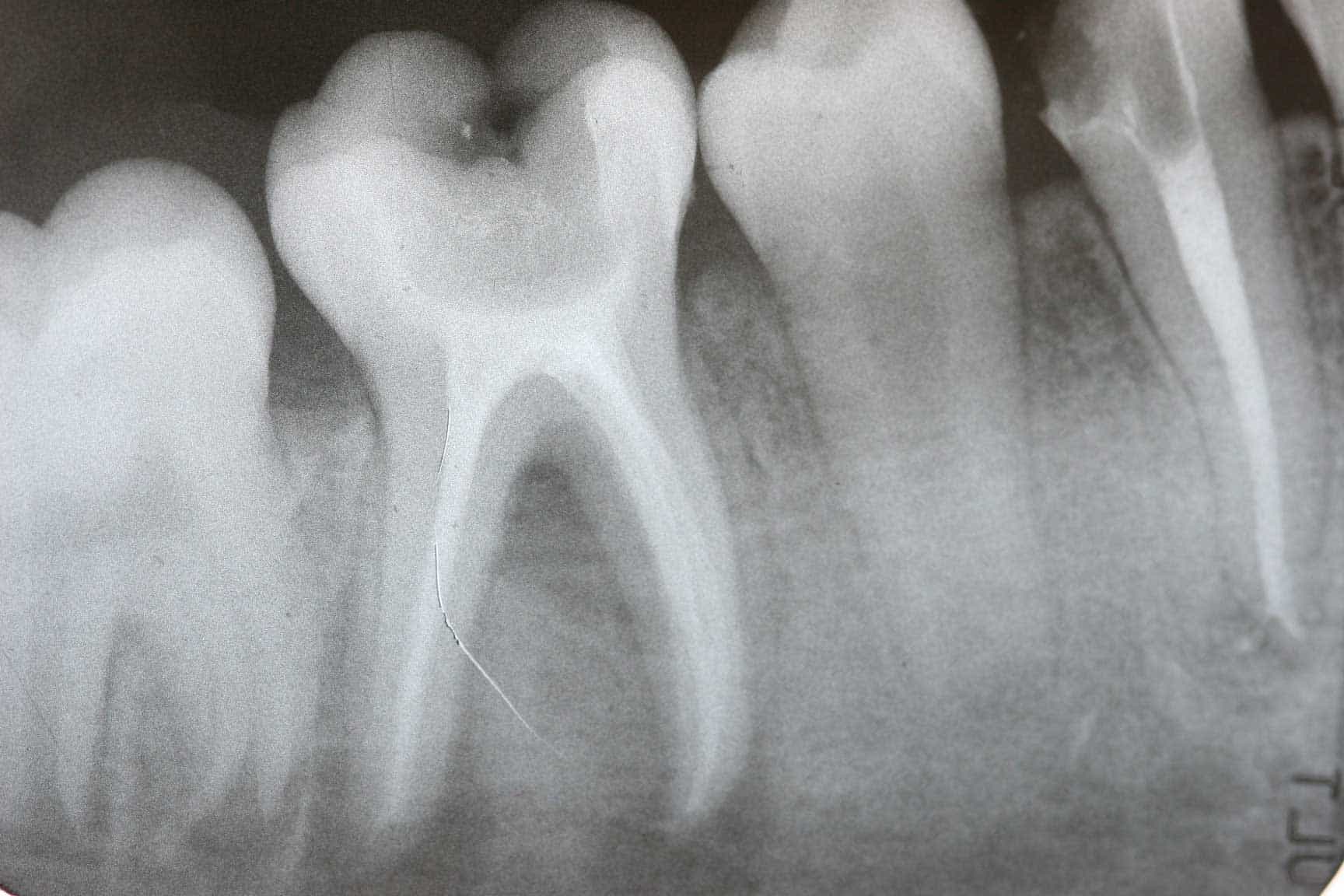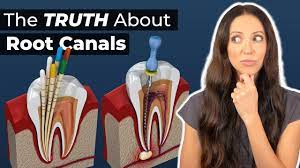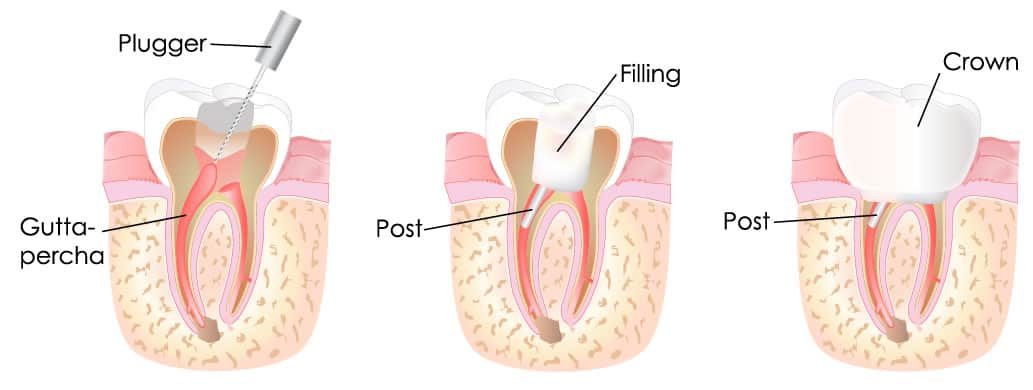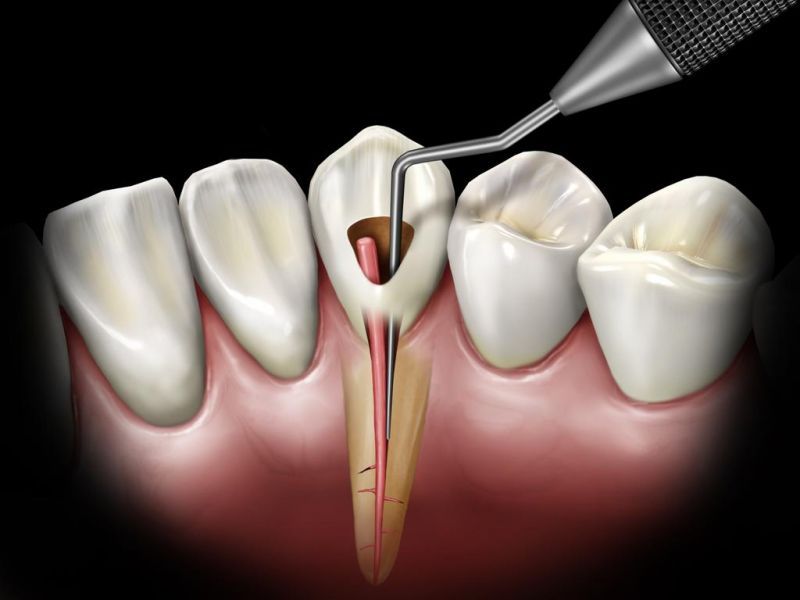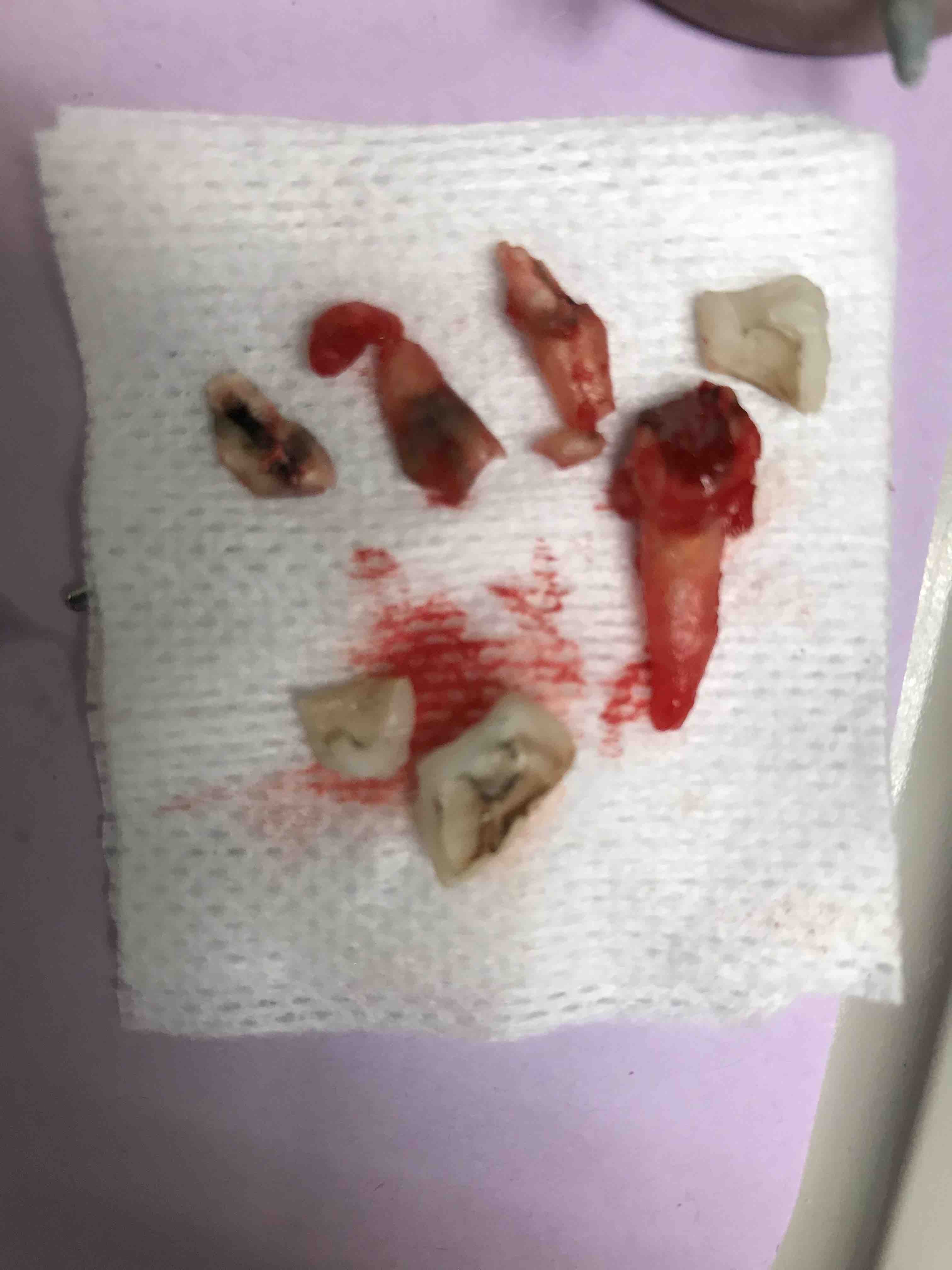If you’re considering a root canal, you may wonder what is a ‘holistic root canal’ and how it differs from standard treatments. Holistic root canal therapy embraces a full-body approach to dental care, aiming not just to resolve tooth infections but also to enhance your overall health. This method applies biocompatible materials and minimally invasive techniques, focusing on your long-term wellbeing. Dive into our thorough guide to understand how holistic dentistry can offer gentler, yet effective, solutions for your dental needs.
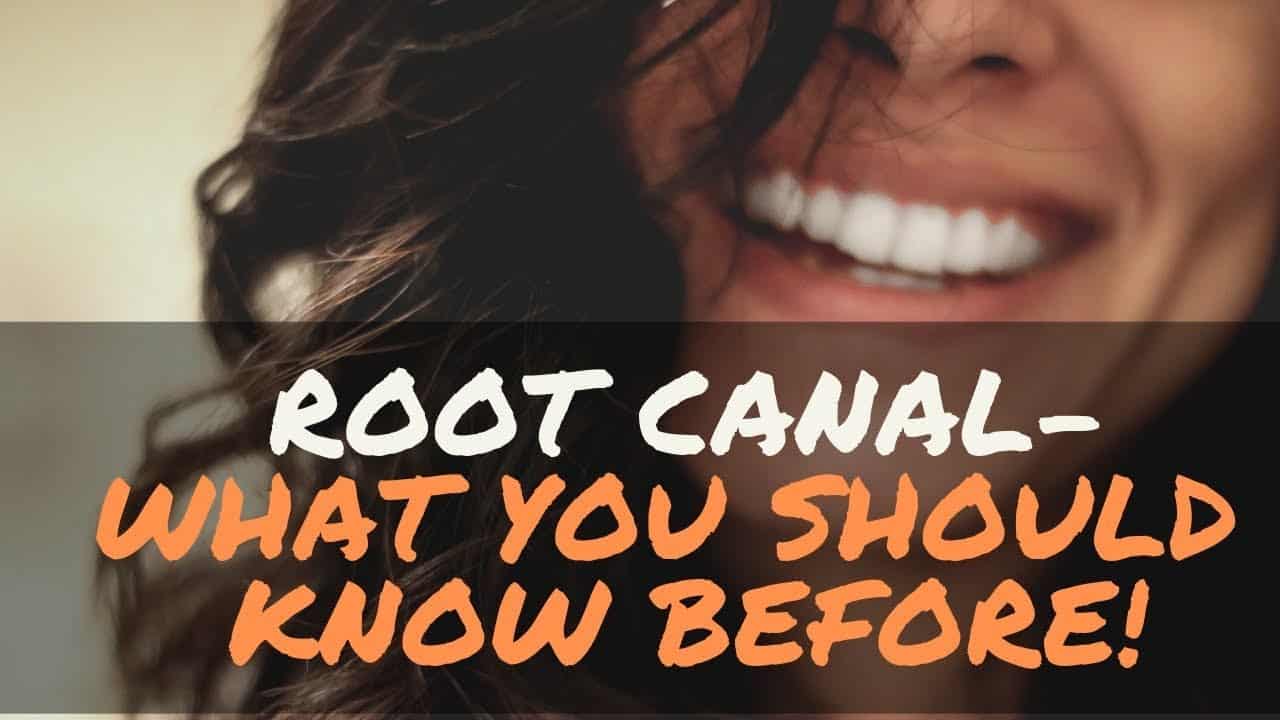
Important Points about Holistic Root Canal Treatments
- Holistic root canal therapy focuses on the patient’s whole-body health, using biocompatible materials and minimizing invasive procedures while aiming to enhance the body’s natural healing capabilities and long-term well-being.
- Holistic dentistry offers minimally invasive techniques like the use of dental ozone gas and laser-assisted procedures, as well as non-toxic, biocompatible materials for fillings and restorations to reduce the risk of adverse immune reactions and improve recovery.
- Alternatives to traditional root canal treatments in holistic dentistry include tooth extraction with biocompatible zirconia implant replacements, herbal and nutritional support for oral health, and therapies aimed at boosting the immune system’s ability to fight infection.
- The biggest decision about getting a holistic root canal is whether to get a root canal or have the tooth removed. Many holistic professionals believe root canals are a source of infection and lead to systemic inflammation and disease. When the pulp of a tooth becomes unhealthy and dies, root canal treatment is necessary to preserve the tooth in the mouth is to do a root canal. If a root canal is not done, the tooth needs to be removed to get rid of infection. Once a tooth is removed, it should be replaced with an implant to avoid teeth shifting and bite collapse.
Sometimes the biggest decision is whether to get a root canal or replate the tooth with dental implant. One consideration is the costs of root canals compared to dental implants.
Understanding Holistic Root Canal Therapy
Holistic root canal therapy is a distinctive approach that views dental care from a whole-body perspective. Its main philosophy revolves around aligning with the body’s natural healing abilities while considering the overall health of the patient. This contrasts with conventional root canal procedures, which primarily focus on the infected tooth.
Holistic dentistry goes the extra mile. It aims to preserve not just the tooth, but also the patient’s overall well-being. This includes addressing long-term health impacts that could potentially arise from using toxic materials in dental procedures. This unique approach was influenced by the research of Dr. Hal Huggins and others, who argued that traditional root canal treatments may neglect systemic health by allowing pathogens and toxins to remain within the tooth structure. Some key features of holistic dentistry include:
- Using biocompatible materials for dental restorations
- Avoiding the use of mercury in dental fillings
- Considering the impact of dental treatments on the body’s overall health
- Promoting preventive care and natural remedies for oral health issues
By adopting a holistic approach to dentistry, practitioners aim to provide comprehensive care that supports the patient’s overall well-being.
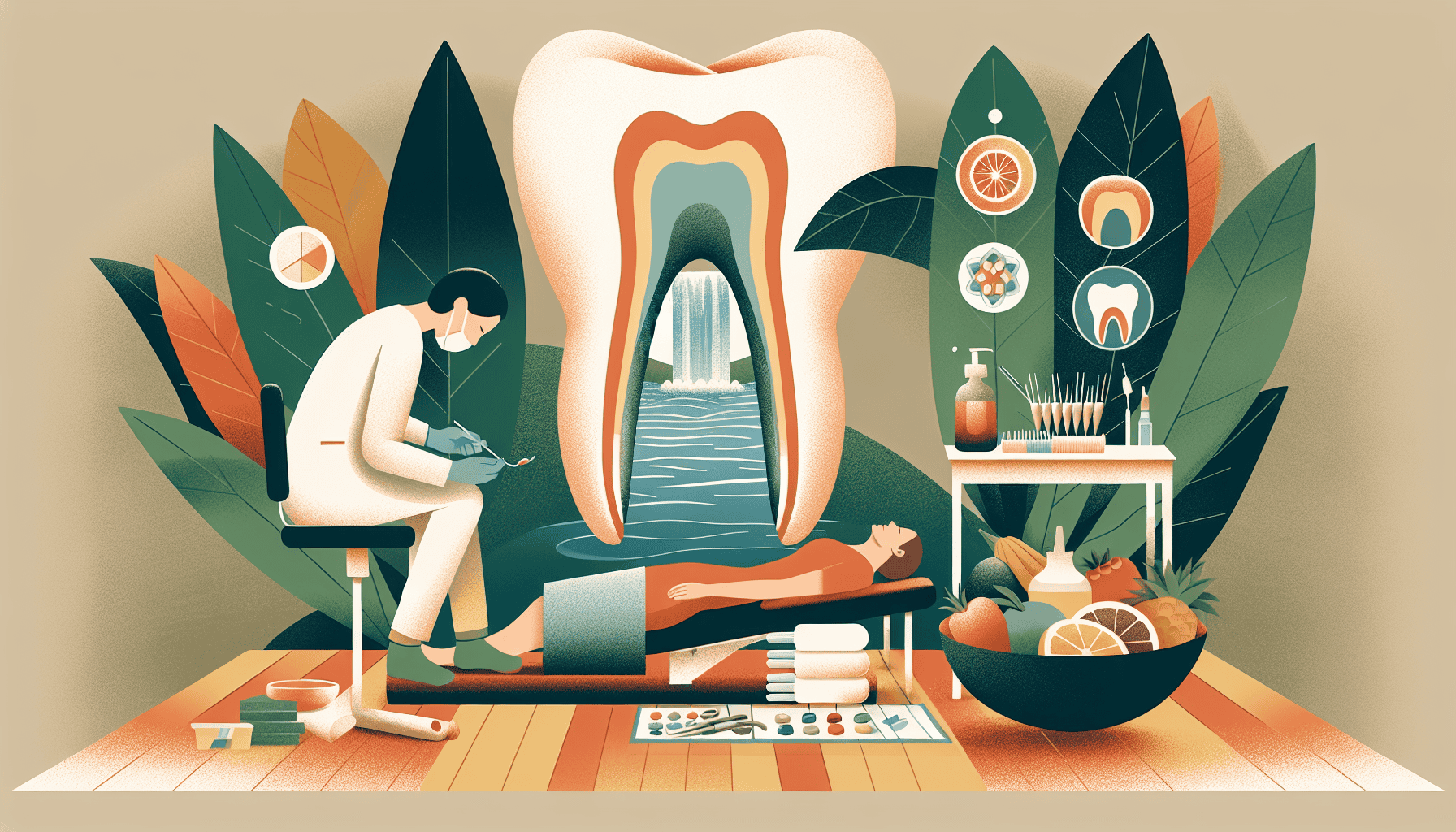
The Philosophy Behind Holistic Dental Care
Holistic dentistry emphasizes that oral health is crucial for overall well-being. It considers the relationship between dental health and the body’s holistic wellness. It carefully selects methods and materials that harmonize with the body’s natural healing abilities, ensuring a comprehensive understanding of the connection between oral health and your systemic health is maintained.
Preventive care is pivotal in holistic dentistry. It aims to maintain oral health and prevent disease, taking into account various schools of thought concerning dental treatments like root canals.
Additionally, holistic dentists may offer complementary services such as nutritional advice and alternative therapies, aligning with the philosophy of treating the body as a whole.
Assessing the Need for Root Canal Treatment
When it comes to root canal treatment, holistic dentists adopt a highly personalized approach. Each patient’s unique oral and systemic health situation is carefully evaluated. This includes considering the patient’s overall health, such as any chronic illnesses and their immune system’s functionality.
Holistic approaches in dentistry focus on:
- the health of surrounding tissues
- the impact of procedures like root canal treatment on a patient’s immune system, including potential risks of bacteremia
- aiming to maintain oral health and systemic well-being
- exploring alternative routes that could potentially eliminate the need for root canal treatment.
Minimally Invasive Techniques in Holistic Endodontics
Holistic endodontics is setting new standards with its minimally invasive techniques. These procedures aim to preserve as much of the natural tooth structure as possible, using gentle, non-invasive, and biocompatible treatment methods.
Let’s delve deeper into these innovative techniques, including the application of ozone gas, laser-assisted procedures, and the use of biocompatible filling materials.
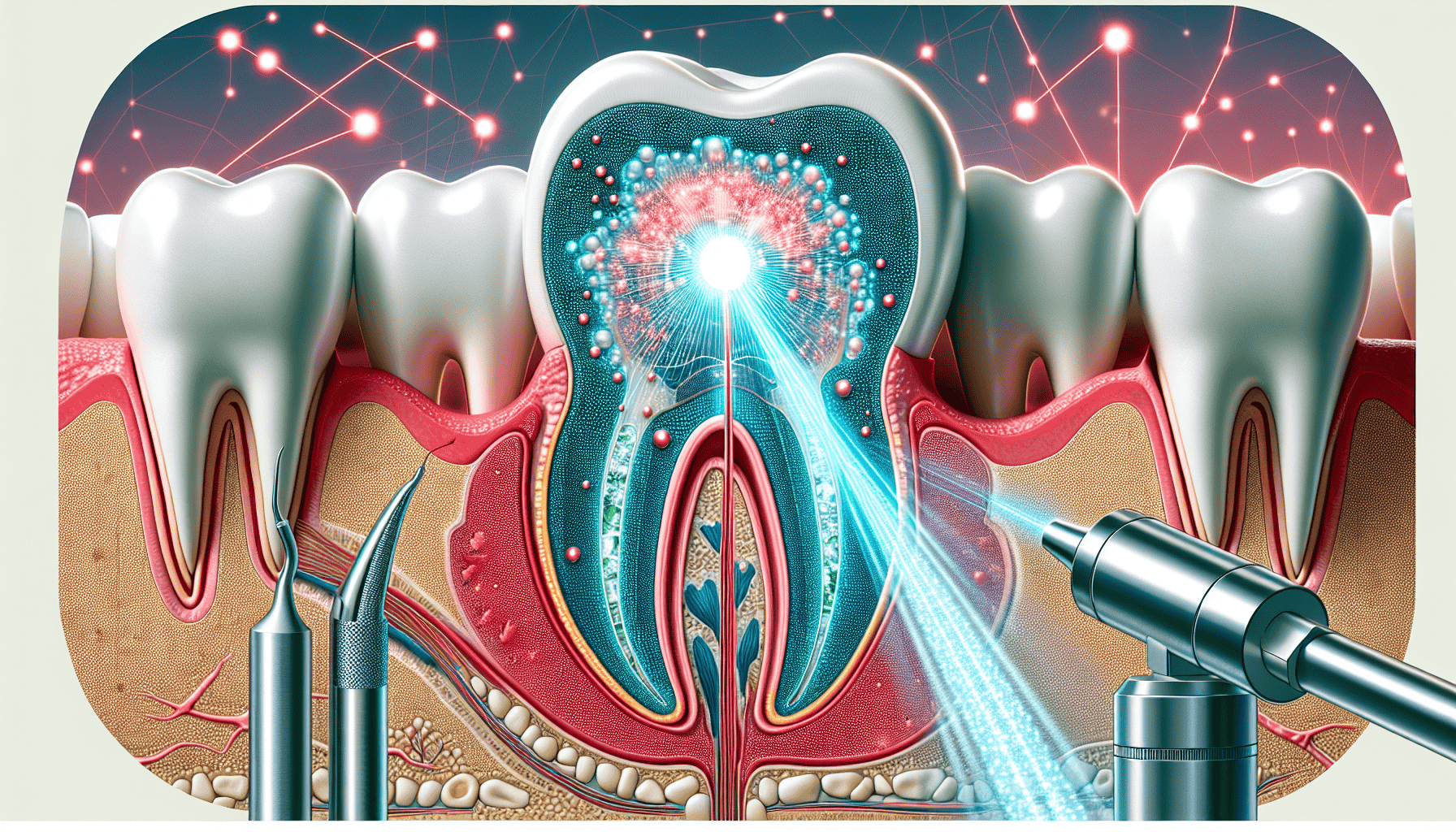
Innovative Use of Ozone Gas to Clean Root Canals
One of the innovative techniques adopted in holistic dentistry is the use of ozone gas. Thanks to its powerful antibacterial action, ozone can damage bacterial cell membranes and disrupt intracellular content through oxidation. When used in infected root canals, gaseous ozone significantly reduces the number of aerobic and anaerobic bacterial colonies, thereby enhancing the dental disinfection process. Gas can penetrate into very small spaces that liquid cleaners cannot and therefore can do a much better job of removing infection without any toxic effects.
Boosted by sodium hypochlorite as an irrigant, gaseous ozone can amplify the antibacterial effects against root canal infections. Interestingly, even short applications of ozone gas can drastically reduce bacterial colony counts in root canals. Beyond sterilizing the root canal system, ozone therapy may eliminate the need for traditional chemical disinfectants in the process.
This treatment involves irrigating the tooth cavity with ozone gas, which can disinfect and potentially prevent the need for a root canal by preserving the tooth.
Laser-Assisted Holistic Root Canal Procedures
Another minimally invasive method employed in holistic dentistry is laser-assisted root canal treatment. This root canal procedure directly targets and eradicates root canal infection within the root canal system, reducing damage to the tooth structure and supporting healing in root canal treated teeth. Laser-assisted root canal procedures enhance the removal of infected tissue, accomplishing a thorough cleaning of the infected root canal more efficiently and with less bleeding, ultimately leading to root canals that are healthier and more stable.
Fotona Laser technology, for instance, uses advanced techniques such as Super Short Pulse irrigation and Photo-acoustic Streaming to significantly optimize cleaning and disinfection. Interestingly, patients who undergo laser root canal treatments commonly report experiencing less pain and discomfort compared to those who undergo conventional root canal treatments.
Biocompatible Filling Materials
Biocompatible materials play a crucial role in holistic root canal therapy. Materials such as ceramic and glass ionomer are used to avoid negative reactions with the body, making this approach especially beneficial for patients with sensitivities or allergies. These materials foster an optimal healing environment, aiding in a smoother recovery process.
Holistic endodontics often involve the use of the following filling materials:
- BPA-free sealants
- Plastic
- Resin
- Zirconium implants
These materials are not only aesthetically pleasing but also align with the natural chemistry of the body. To ensure safety and bio-compatibility, practitioners of holistic dentistry prioritize the use of non-toxic substances such as calcium hydroxide that promote healing without posing a burden on the immune system.
Alternatives to Traditional Root Canal Treatments
Holistic dentistry goes beyond traditional root canal treatments, offering alternatives with a focus on whole-body health. Let’s explore these alternatives in detail, including the role of tooth extraction, herbal and nutritional support, and support for immune system health.
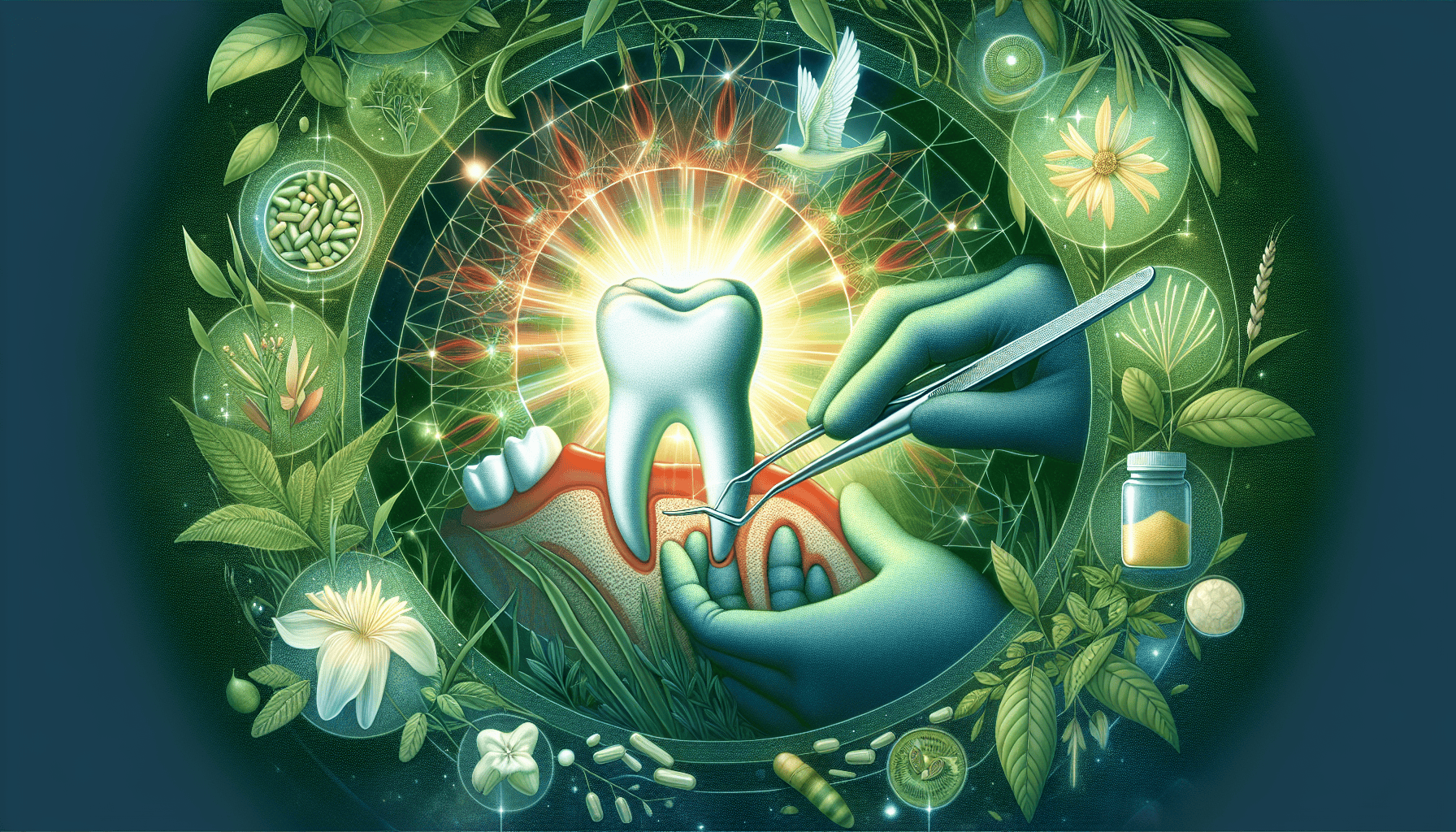
The Role of Tooth Extraction
Tooth extraction is often considered a preferable alternative to root canal treatment in certain situations within the realm of holistic dentistry, especially when dealing with a dead tooth. In this context, exploring alternatives to root canal treatments, such as tooth extraction, becomes essential. Following extraction, the focus shifts to replacing the tooth with non-toxic, body-friendly materials that support overall health.
Biocompatible materials for tooth replacement range from bridges to metal-free dental implants and partial dentures. These options ensure that patients can still enjoy a full, functional smile even after tooth extraction.
Herbal and Nutritional Support for Infected Teeth
Holistic dentistry takes a comprehensive approach towards treating dental infections. This includes recommending herbal remedies and dietary changes to support the body’s natural defense against such infections. Some commonly recommended herbal remedies to naturally combat dental infections are:
- Turmeric
- Garlic
- Tea tree
- Oregano
Dietary changes also play a crucial role in holistic dentistry. Reducing processed sugars, adding high-quality proteins, and minimizing grain products can help prevent dental infections and support overall dental health. Patients are coached on how to integrate these natural products and remedies into their regular dental care practices at home.
Supporting Immune System Health
A cornerstone of holistic dentistry is the focus on supporting immune system health. This is crucial in preventing and treating dental infections. Residual bacteria and toxins in a tooth after root canal therapy are seen as a potential source of systemic health issues. Root-filled teeth can have systemic effects, potentially leading to symptoms in other areas and organs of the body. Some of the common symptoms that may be associated with root-filled teeth include:
- Chronic fatigue
- Headaches
- Joint pain
- Digestive issues
- Skin problems
- Allergies
By addressing the health of your teeth and gums, you can support your overall immune system and improve your overall health.
Ozone therapy used in holistic dental care has several benefits, including:
- Stimulating the immune system
- Enhancing the body’s natural defenses
- Supporting the body in fighting off potential infections
- Maintaining overall health
The Advantages of Choosing a Holistic Root Canal
Choosing a holistic root canal offers numerous advantages. Here are some of them:
- This approach uses natural, biocompatible materials that are less likely to trigger immune responses post-operation.
- This minimizes side effects and long-term complications associated with root canal therapy.
- It leads to quicker healing times and reduced discomfort.
Holistic dentists use surgery as a last resort, emphasizing preventive oral hygiene and offering integrative therapies beyond conventional treatments. Patients with allergies or sensitivities may choose holistic root canals to avoid adverse reactions associated with traditional methods. Holistic root canals are just as effective at treating infection and preserving root canaled teeth while aligning with patients’ overall wellness goals.
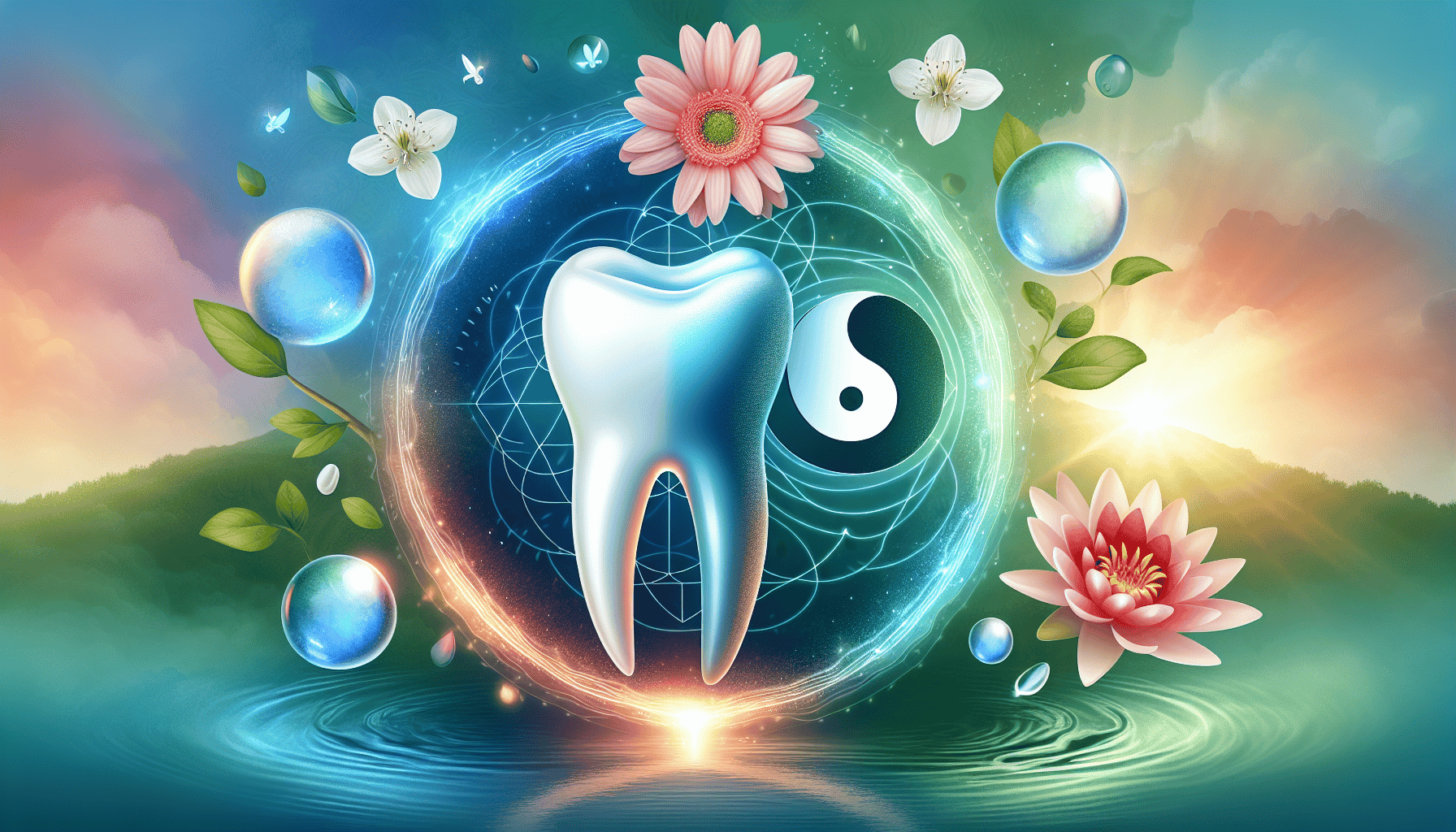
Comparing Costs: Holistic vs. Conventional Root Canals
When it comes to costs, holistic root canals can vary. While sometimes aligning with conventional treatment prices, they are designed for long-term health benefits. Materials used in holistic root canals and the complexity of the case may contribute to a higher upfront cost. Still, it’s important to remember that these treatments aim to benefit your long-term health.
Holistic dentistry may involve higher initial costs due to the use of biomimetic materials. However, these lead to less invasive treatments and potentially lower overall healthcare costs. By focusing on prevention and natural therapies, holistic dental treatments can offer long-term health benefits and possibly lower overall healthcare costs.
Finding a Qualified Holistic Dentist
Finding a qualified holistic dentist is an essential part of embarking on your holistic dental care journey. A holistic dentist:
- Combines alternative methods with traditional dental techniques
- Holds a general dental degree and license
- Follows a bachelor’s degree, a DDS, or DMD degree
- Successfully completes the National Board Dental Examination
- Passes a clinical examination by a state or regional board of dentistry
When selecting a holistic dentist, consider the following:
- Research practitioners who adhere to holistic principles
- Look for dentists with the necessary qualifications
- Find dentists who are affiliated with recognized holistic dental associations
Resources like the searchable database provided by the Holistic Dental Association can be a valuable tool to locate holistic dentists by country.
Summary
In summary, holistic root canal therapy offers a comprehensive, whole-body approach to dental care. From minimally invasive techniques and biocompatible materials to a focus on overall health, this approach is redefining endodontic treatment. While it may involve higher initial costs, the long-term health benefits and focus on prevention can potentially lower overall healthcare costs. Remember, choosing the right holistic dentist is pivotal to your journey towards holistic dental care.
Frequently Asked Questions
Holistic root canal therapy is a dental procedure that prioritizes overall well-being and long-term health by avoiding toxic materials and preserving the tooth, unlike traditional root canal treatments.
Holistic dentistry sees oral health as crucial to overall wellness, using natural methods and materials that align with the body’s healing abilities.
In holistic dentistry, alternatives to traditional root canal treatments include tooth extraction followed by the use of biocompatible materials for tooth replacement, herbal remedies, dietary changes, and supporting immune system health. These alternatives focus on overall health and natural solutions.
Choosing a holistic root canal offers advantages such as reduced side effects, faster healing, and alignment with overall wellness goals. It provides effective infection treatment and natural tooth preservation compared to traditional methods.
You can find a qualified holistic dentist by researching practitioners who adhere to holistic principles, have the necessary qualifications, and are affiliated with recognized holistic dental associations. The Holistic Dental Association provides a searchable database to help you locate holistic dentists by country.

 (301) 421 1996
(301) 421 1996 burtonsvillesmiles@gmail.com
burtonsvillesmiles@gmail.com